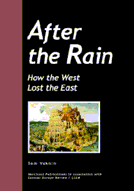Amid the general triumphalism and euphoria of the media and the diplomats, many commentators wisely remind us of the unfinished business, upcoming hurdles and unresolved conflicts that face Serbia and its neighbors.
But some go even further, notably in recent CER articles. Patrick FitzPatrick (9 October) and Martin Brown (16 October) dismiss comparisons with the revolutions of 1989, claiming, in FitzPatrick's words, that Serbia voted for "a little bit of change and a lot of continuity," for a nationalist program "continuous with Milošević's earlier (failed) promises of Greater Serbia." And Sam Vaknin writes that "Koštunica is nothing but a soft-spoken version of Milošević." (9 October)These views go beyond healthy skepticism. They distort the causes and consequences of the events of the last few weeks, which undeniably portend fundamental changes.
Undue cynicism stems in part from misunderstandings and stereotypes about Serbia. Take, for example, Charles Ingrao's pre-election predictions (CER, 4 September). He dismissed the possibility that a vote could loosen Milošević's grip on power: Koštunica's candidacy was a mere "mirage" given the unfair voting conditions.
And in any case Milošević enjoyed the "passive support of a silent majority of Serbs": "mass ignorance" due to functional illiteracy and nationalist mythology was so great as to "virtually foreclose the ability to question the veracity of government propaganda or to critically analyze evidence."
Such oversimplifications led to a misreading of the situation, and now they underlie doubts about the meaningfulness of Milošević's fall. A more nuanced and accurate view of Serbia, however, gives reason for greater optimism. New York Times correspondent Steven Erlanger made this point recently (15 October) in an article on the most widely asked question:
Will the Serbs as a nation face their responsibility—collective guilt is what many mean but don't like to say—for the various crimes committed by their forces, or in their name, in Bosnia and Kosovo?
What is not well understood is that a basis for self-examination already exists in what is called civil society—among journalists, academics, cultural and political figures who have been asking these questions since long before Milošević was voted out and then forced out of power.
To be sure, these people have been largely marginalized, often villified. But the new political and cultural openness promises an expanded platform for their message. One of the first broadcasts of Serbia's newly "liberated" state television was a documentary featuring footage of atrocities by Serb forces in Bosnia and Kosovo.
Many will be unreceptive, of course. But an end to isolation and constant condemnation will make it much easier for many Serbs to drop their defenses and approach their past more objectively.
Too often, the prospect of such gradual but crucial developments is ignored in favor of much narrower and ultimately less important issues: Will Milošević end up in the Hague? Isn't Koštunica a nationalist?
As for the first question: probably not. This will be a denial of justice. But it's not the crucial factor it's made out to be. To take another example, it is likely that Croatian society will increasingly come to terms with crimes committed in its name, even though—perhaps even more easily because—Franjo Tuđman met his maker not only untried, but unindicted.
What about Koštunica? Is he Šešelj with a tie? Vaknin's "soft-spoken Milošević"? Granted, in Vaknin's cheery outlook, Koštunica himself is secondary: "Whoever replaces Milošević will go to war with neighbours near and far. It is the nature of the Balkans."
There's actually a grain of truth there: any elected president in this time and place would be a nationalist. The important question is, what kind?
During the wars in Croatia and Bosnia, Koštunica favored the Serbs' right to self-determination, was very critical of American policy and largely silent about Serbian atrocities. Adjectives such as "anti-Western" are off the mark, however. He represents a tradition that ties national identity to Western values, to pride in the democratization, cultural progress and international respect of Serbia's (somewhat mythical) "golden age" before World War I. "Liberal nationalism" may seem like an oxymoron, but in Serbia, as elsewhere, it is much more productive to welcome moves in that direction than to condemn all nationalist sentiment in the vain hope for some leap to cosmopolitanism.
Koštunica's patriotic and anti-NATO credentials were important, but he didn't win on a belligerent or expansionist platform. Quite the opposite: it

|
More broadly, with the earlier democratic changes in Croatia, the decade-long Milošević-Tuđman symbiosis that fueled so much of the former Yugoslavia's violence is finally history.
We did indeed witness a kind of revolution. The foundation now exists for transforming the institutions and norms by which Serbia was governed after 1944, as well as the deformations and additions of the Milošević era.
With continued good will from the outside, Serbia can start down the path of the rest of post-Communist Europe, and by doing so help the rest of the region too. It's not the rosiest road, but it's the closest to "normal" they can get. "We need a normal life in a normal country," declared the opposition during the electoral campaign: one of history's more modest successful revolutionary slogans."
Dušan Djordjevich, 20 October 2000
Rebuttal
That the events of the last few weeks "undeniably portend fundamental changes" is where we differ. It is somewhat hubristic to pronounce such a sentence with the benefit of only a few weeks' perspective. Moreover, a millennium of Balkan history teaches us one irrefragable lesson with sad certainty: the more the slough changes, the more it remains the same.
The second point of disagreement is that Serbia has a civil society. The latter does not miraculously spring in a decade or two, fully precocial. It is the outcome of drawn out historical processes and continuous interactions between narratives and power foci. The callow "intelligentsia" of the Balkan is a circumambiently corrupt, venal, malicious, xenophobic, conniving, narrow-minded and short-sighted lot.
They have proven it time and again in each phase of the Yugoslav cessation wars. Šešelji and Karadžić are PhDs—as was Tuđman. There was—and is—no meaningful soul-searching in Serbia, no accounting, no transparency, no adjudication and no dialogue. No one assumed responsibility, allocated blame, atoned for guilt, proscribed behaviours or offered a substantially different agenda—least of all the sudden argosy of "intellectuals."
In the most important respect—the animus of flagrant, barbarous, exclusionary and xenophobic nationalism—Koštunica is the continuation of Milošević by other means. There are courageous though etiolated exceptions of course. But, in their state of purdah, they only serve to show the rule.
Whether Koštunica is an ultra-nationalist is not a "narrow" or "less important" issue. Whether Milošević will face justice is not irrelevant. This is the crux of our debate and the very fulcrum of Serbia's continuing conflict with the world.
Serbia's nationalism (as well as Croatia's) was not a solecism. It led to a hellish bloodbath. Its past leader was involved in a diapason of mass murders. It is very telling that Mr Djordjevic seems to think these are minor issues. It just goes to show how faux this "revolution" is—constructed, as always, on denial of responsibility, suppression of the truth, protection of the criminal and collaboration with a bloody, disastrous past.
Koštunica is not a banausic "liberal nationalist" (whatever this oxymoron signifies). He is more likely to be a nostrum or someone's puppet. Granted, he has always supported the rule of law and democracy. But, he is a nationalist. He lost his job vilifying the 1974 constitution. He started the Democratic Party of Serbia in 1992 because the Democratic Party was too Milošević-friendly to his taste. And then there is the infamous Kalashnikov-toting Koštunica in Kosovo. He pledges to uphold the Dayton accords, but so did Milošević. And he is much closer to the effluvium of Republika Srpska than Milošević ever was.
The clash between lofty ideals and baser ones has always been at the core of the romantic political scene in Serbia. The outcome, alas, was always the same to the detriment of Serbia and its neighbours.
The alternative to intractable nationalism is not tractable cosmopolitanism. This is Milošević (rather his wife) speaking from within the text. This charming couple used to accuse dissenters and dissidents of being cosmopolitan. The alternative, rather, is sanity and co-existence. And, yes, normalcy.
Koštunica should be given the benefit of the doubt by all means. But the West should learn from its mistakes hitherto. This time around, it should be clear, firm, decisive, immediate and forceful. Serbia and Croatia are on probation as they embark upon the emprise of joining the community of nations. Let this not be forgotten in the paroxysms of enthusiasm that engulfed us all at the epiphany of this Serb epigone of a quasi-normal politician.
Sam Vaknin, 20 October 2000
The case for:
Read Sam Vaknin's article arguing for the thesis.
Author note:
Sam Vaknin is General Manager of Capital Markets Institute Ltd, a consultancy firm with operations in Macedonia and Russia. He is an Economic Advisor to the Government of Macedonia.
DISCLAIMER: The views presented in Sam Vaknin's articles represent only the personal opinions and judgements of the author.
Moving on:

Sam Vaknin's book on sale from CER as a print book and as an ebook
Read an external review
|
- Archived articles on Yugoslavia
- Archive of Sam Vaknin's articles in CER
- Browse through the CER eBookstore for electronic books
- Buy English-language books on Central Europe through CER
- Sam Vaknin's Website
- Return to CER front page



